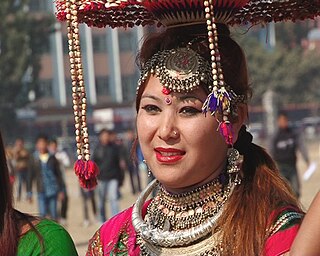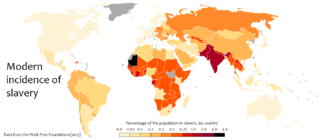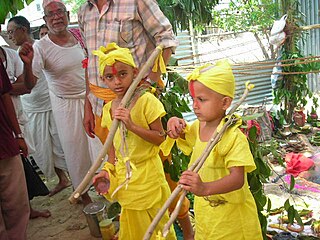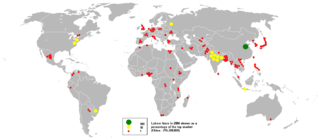
The history of Nepal is intertwined with the history of the broader Indian subcontinent and the surrounding regions, comprising the areas of South Asia and East Asia.

The politics of Nepal functions within the framework of a parliamentary republic with a multi-party system. Executive power is exercised by the Prime Minister and their cabinet, while legislative power is vested in the Parliament.

Debt bondage, also known as debt slavery, bonded labour, or peonage, is the pledge of a person's services as security for the repayment for a debt or other obligation. Where the terms of the repayment are not clearly or reasonably stated, the person who holds the debt has thus some control over the laborer, whose freedom depends on the undefined debt repayment. The services required to repay the debt may be undefined, and the services' duration may be undefined, thus allowing the person supposedly owed the debt to demand services indefinitely. Debt bondage can be passed on from generation to generation.

The Nepalese Civil War was a protracted armed conflict that took place in the former Kingdom of Nepal from 1996 to 2006. It saw fighting between the Nepalese royal government and the Communist Party of Nepal (Maoist) throughout the country. The war was the decisive factor that led to the collapse of the Nepalese kingdom in 2008 and the subsequent establishment of the present-day Federal Democratic Republic of Nepal.

The Communist Party of Nepal , abbreviated CPN (Maoist), CPN-Maoist, CPN Maoist, or CPN(M), is the third largest political party in Nepal. It was founded in 1994 after breaking away from the Communist Party of Nepal.

Sher Bahadur Deuba is a Nepali politician serving as the prime minister of Nepal since 13 July 2021. He has also been serving as the president of the Nepali Congress since 2016. Deuba has previously served four terms as the prime minister and is the Member of Parliament for the parliamentary constituency of Dadeldhura 1.

The Tharu people are an ethnic group indigenous to the Terai in southern Nepal and northern India. They are recognized as an official nationality by the Government of Nepal. In the Indian Terai, they live foremost in Uttarakhand, Uttar Pradesh and Bihar. The Government of India recognizes the Tharu people as a scheduled tribe.

The 2006 Democracy Movement is a name given to the political agitations against the direct and undemocratic rule of King Gyanendra of Nepal. The movement is also sometimes referred to as Jana Andolan II, implying it being a second phase of the 1990 Jana Andolan.
Kamaiya and Kamlari were two traditional systems of bonded labour practised in the western Terai of Nepal. Both were abolished after protests, in 2000 and 2006 respectively.
Madheshi people is a term used for several groups of people living in the Terai region of Nepal, literally meaning the people of Madhesh. It has also been used as a political pejorative term by the Pahari people of Nepal to refer to non-pahari people with a non-Nepali language as their mother tongue, regardless of their place of birth or residence. The term Madheshi became a widely recognised name for Nepali citizens with an Indian cultural background only after 1990. Madheshi people comprise various cultural groups such as Hindu caste groups, Muslims, Marwaris, Brahmin and Dalit caste groups, ethnic groups like Maithils, Bhojpuri, Awadhi and Bajjika speaking people and indigenous people of the Terai. Many of these groups share cultural traditions, educational and family ties with people living south of the international border in Bihar, Uttar Pradesh and West Bengal. Tharu people and Pahari people living in the Terai do not consider themselves as Madheshi. In recent times, some politicians and journalists use the term for all Nepali citizens of the Terai.

King Gyanendra of Nepal had dissolved the House of Representatives on 21 May 2002. The parliament was reinstated on 24 April 2006 with 204 of the original members. The first meeting of the reinstated parliament was held four days later on 28 April 2006. On 15 January 2007, an interim legislative parliament was formed after the Comprehensive Peace Accord was between the Seven Party Alliance and the Communist Party of Nepal (Maoist). The Maoists were included in the new parliament and the total number of members was increased to 329.
Child Workers in Nepal (CWIN) is a non-governmental organization (NGO) working as an advocate for children's rights. CWIN supports street children, children subjected to child labour, children who are sexually exploited, and also those victimized by violence. The organization's objective is to protect the rights of children in Nepal. It was established in 1987 by a group of students at Tribhuvan University who, upon investigating the conditions of children living on the streets in Kathmandu, Nepal, recognized the need for advocacy in this area. As a "watchdog" in the field of child rights in Nepal, CWIN acts as a voice for the disadvantaged and exploited children. It does this by lobbying, campaigning, and pressuring the government to protect and promote children's rights, and to end exploitation, abuse and discrimination against children.
Hardauna is a village in the sub-metropolitan municipality of Maharajganj in the Kapilvastu District of the Lumbini Province. The village is in a terai region in southern Nepal. It is on the Banganga, a river which arises on the southern slopes of the Sivalik Hills and flows across the terai, reaching into Uttar Pradesh state in India.

The Communist Party of Nepal , abbreviated CPN (RM), is a communist party in Nepal. It was founded on June 2012 by the then vice-chairman of Unified Communist Party of Nepal (Maoist), Mohan Baidya after splitting from the party.

Debt bondage in India or Bandhua Mazdoori was legally abolished in 1976 but remains prevalent due to weak enforcement by the government. Bonded labour is a system in which lenders force their borrowers to repay loans through labor. Additionally, these debts often take a large amount of time to pay off and are unreasonably high, propagating a cycle of generational inequality. This is due to the typically high interest rates on the loans given out by employers. Although debt bondage is considered to be a voluntary form of labor, people are forced into this system by social situations.

Constituent Assembly elections were held in Nepal on 19 November 2013. The vote was repeatedly delayed, having previously been planned for 22 November 2012 following the dissolution of the 1st Constituent Assembly on 27 May 2012, but it was put off by the election commission. The Nepali Congress emerged as the largest party in the 2nd Nepalese Constituent Assembly, winning 196 of the 575 elected seats.

Tagadhari are members of a Nepalese Hindu group that is perceived as historically having a high socio-religious status in Nepalese society. Tagadhari are identified by a sacred thread (Janai) around the torso, which is used for ritualistic purposes in Hinduism. In Sanskrit the sacred thread is called yajñopavītam and in Nepali Janai. The cord is received after the Upanayana ceremony. Tagadharis were historically favoured by the government of Nepal and various religious and caste-based legal provisions were enacted on their behalf. The legal code of 1854, Muluki Ain, which was introduced by Chhetri Maharaja and Prime Minister of Nepal, Jang Bahadur Kunwar Ranaji made it impossible to legally enslave Tagadharis and decreed fewer punishments for them in comparison to Matawali and Dalits.

Nepal has a labour force of 16.8-million-workers, the 37th largest in the world as of 2017. Although agriculture makes up only about 28 per cent of Nepal's GDP, it employs more than two-thirds of the workforce. Millions of men work as unskilled labourers in foreign countries, leaving the household, agriculture, and raising of children to women alone. Most of the working-age women are employed in agricultural sector, contributions to which are usually ignored or undervalued in official statistics. Few women who are employed in the formal sectors face discrimination and significant wage gap. Almost half of all children are economically active, half of which are child labourers. Millions of people, men, women and children of both sexes, are employed as bonded labourers, in slavery-like conditions. Trade unions have played a significant role in earning better working conditions and workers' rights, both at the company level and the national government level. Worker-friendly labour laws, endorsed by the labour unions as well as business owners, provide a framework for better working conditions and secure future for the employees, but their implementation is severely lacking in practice. Among the highly educated, there is a significant brain-drain, posing a significant hurdle in fulfilling the demand for skilled workforce in the country.
The haruwa–charuwa system is a forced-labour system based on debt bondage, prevalent in the agricultural sector of the eastern Terai region in Nepal. Haruwa means "forced tiller" and are usually adult males, while charuwa means "forced cattle-herder" and are usually women and children. The victims of this bonded labour system are usually dalit families, most commonly from the Musahar caste. Due to landlessness and poverty, they are forced into service of landowner families under slavery-like conditions. The haruwa–charuwa system is similar to the Haliya and Kamaiya systems of western Nepal.













